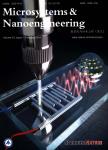Single-cell sorting based on secreted products for functionally defined cell therapies
作者机构:Department of BioengineeringUniversity of California-Los AngelesLos AngelesCA 90095USA Department of Chemical and Biomolecular EngineeringUniversity of California-Los AngelesLos AngelesCA 90095USA Partillion BioscienceLos AngelesCA 90095USA Department of Mechanical and Aerospace EngineeringUniversity of California-Los AngelesLos AngelesCA 90095USA California NanoSystems Institute(CNSI)University of California-Los AngelesLos AngelesCA 90095USA
出 版 物:《Microsystems & Nanoengineering》 (微系统与纳米工程(英文))
年 卷 期:2022年第8卷第4期
页 面:17-34页
核心收录:
学科分类:1002[医学-临床医学] 1010[医学-医学技术(可授医学、理学学位)] 100215[医学-康复医学与理疗学] 10[医学]
基 金:National Science Foundation Award#1160504 National Institute of Health Awards#DK128730,CA256084,and GM142174
主 题:therapies sorting realization
摘 要:Cell therapies have emerged as a promising new class of“livingtherapeutics over the last decade and have been particularly successful for treating hematological ***,cellular therapeutics are being developed with the aim of treating almost any disease,from solid tumors and autoimmune disorders to fibrosis,neurodegenerative disorders and even aging ***,their therapeutic potential has remained limited due to the fundamental differences in how molecular and cellular therapies *** the structure of a molecular therapeutic is directly linked to biological function,cells with the same genetic blueprint can have vastly different functional properties(e.g.,secretion,proliferation,cell killing,migration).Although there exists a vast array of analytical and preparative separation approaches for molecules,the functional differences among cells are exacerbated by a lack of functional potency-based sorting *** this context,we describe the need for next-generation single-cell profiling microtechnologies that allow the direct evaluation and sorting of single cells based on functional properties,with a focus on secreted molecules,which are critical for the in vivo efficacy of current cell *** first define three critical processes for single-cell secretion-based profiling technology:(1)partitioning individual cells into uniform compartments;(2)accumulating secretions and labeling via reporter molecules;and(3)measuring the signal associated with the reporter and,if sorting,triggering a sorting event based on these reporter *** summarize recent academic and commercial technologies for functional single-cell analysis in addition to sorting and industrial applications of these *** approaches fall into three categories:microchamber,microfluidic droplet,and lab-on-a-particle ***,we outline a number of unmet needs in terms of the discovery,design and manufacturing of cellular therapeutics a



